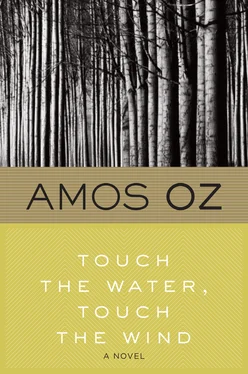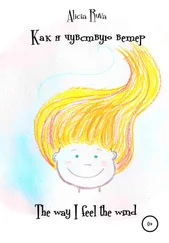He would suddenly remember snow. From here it seemed to him an absurd, lunatic image, perhaps a painted scene in an old-fashioned opera. The snow-capped peak of Mount Hermon which could sometimes be seen from Tiberias reminded him of the cheap gaudy oil paintings which peasants who had made good hung in their new houses, above the pianos on which their daughters were forced to practice to the point of despair.
Tiberias smelled of baking fish in the afternoon, and of rotting fish at night. And at almost every hour of the night and day there blew from the lake a slight, stubborn smell of putrefaction. Peanuts, fizzy lemonade, lottery tickets, chocolate-ices, Egged buses, evening papers — all constantly clamored for recognition, at least de facto.
In contrast to all this there were hints of an entirely different presence. It was commonly believed and persistently maintained that close at hand, just beyond the boulder-strewn slopes opposite, on the other side of the scorched mountain range, lay the veiled city of Damascus, and Abana and Pharpar, its rivers. Springs and fountains, myrrh and frankincense almost within touching distance.
The need to guard against nostalgia.
Concentrate your attention on the here-and-now: Tiberias, summer, Israel, nineteen-fifty-one, opposite an automobile repair shop, twenty past two in the afternoon, twenty-one minutes past, twenty-two, a cigarette and a bottle of lemonade. And the boy across the street arguing with himself among his junk, and the air full of the smell of dust steeped with grease and gasoline.
Thousands of Jews living in broad daylight in Tiberias, openly, unashamed, with no second line of defense, no bunkers, no split-second disguises, no secret way out, as if it were all over and done with. To the dreamy son of a watchmaker the whole situation was terrible and wonderful. An inconceivable state of affairs, which the heart longed to believe.
Occasionally he tried to sense from a distance, using his thoughts like radar beams, his faraway town of M—. Steeples, bells, and forests. The smell of Stefa's fur coat. Jaroslaw Avenue. The statue of Copernicus. The piles of the bridge and the black river. The attempt was doomed to failure. Those places did not exist and never had existed, because they could not exist and never could have.
But this place, this real place, this hot, panting place, the paraffin cart with its bell, the health clinic, the traffic policeman, the carpet of peanut shells, ration cards, queuing for flour, the smell of fish, and these big brown Jews — could this place possibly exist?
The stranger who steered Stefa by the arm and politely escorted her eastward toward the Russian lines was suspiciously tall thin and deadly. He was no more than a black tail-coat, starched shirt-front, and white tie.
The whole devastated continent seemed to yield to him in total obedience: German guards saluted and made way, officers offered their services, detectives, gendarmes, partisan bands provided guides through the dense forests and shared their food and wine, fishermen ferried them on rafts, peasants lavished hospitality, commissars went out of their way to assist and to please, onward always eastward, toward peasant women joyfully gathering potatoes, toward wide-stretching cornfields, into the rising sun.
Stefa was handed over to the Revolutionary Bureau for Polish Affairs in Krasnoyarsk. After a few simple tests a use was found for her. At first she was set to work editing various publications in Polish, pamphlets, an Open Letter to the Reluctant Intellectual, an address to the workers engaged in rebuilding the ruins of Warsaw, a letter from the Central Committee to the writers of the New Poland on their great day.
This was just a modest beginning. It was not what she was born for.
Soon she could be seen with visiting Polish intellectuals at the theater, in the coffee houses, or boating on the lake, resplendent in evening dress and jet earrings. Stefa could arouse a wild fervor in her guests: in her company they all talked compulsively, some of them seemed fired by grandiose visions and battered her with complex combinations of ideas, others were poetically inspired and painted grandiloquent pictures of a heavenly Warsaw, a New Kingdom of Poland in the Aegean Islands, a synthesis of rival salvations, while Stefa ruthlessly egged them on, drawing the very marrow out of their bones, until the Polish intellectuals sank into a delicious weariness. She had to restrain them forcibly from kneeling down and kissing her feet; she escorted them back to their hotels; they always collapsed as if drunk into a chair in the hotel foyer, and she returned home well after midnight.
Next morning she would draw up a report. Single out, categorize, appraise, recommend:
One way or the other.
Higher and higher the stranger led Stefa. Once a week he would take her for a brief ideological conversation with a group of ancient retired revolutionaries, fathers of the great Revolution. And nightly high and low he slavered over her body with an almost inaudible hissing.
Not alone.
In the small hours of the morning all the ancient revolutionaries clustered into her bed and inscribed slogans and redeeming notions on her white back with slobbering Cyrillic tongues. They clasped her waist with cold, purple-veined fingers, large dead nails of yellow tallow. They were toothless, most of them, and feverish, schooled in lubricity, steering their pleasures with cold stratagems, breathing faint odors and coarse odors in her face, moving methodically, crackling as if their skeletons had collapsed beneath their parchment-pale skins. She would wriggle, with muffled sobs, struggling in vain to kick and escape, the old men were weak but numerous and experienced, and all her efforts only served to inflame still further the swarming lascivious tangle, the sweat ran, the wallowing melee became more and more sticky, frothy, moaning, pierced intermittently by sharp, cruel screams. Between the bodies thick pungent juices squelched. They were so abandoned, those ancient fathers of the great Revolution; till daybreak they were not sated. Stefa sank slowly in the slimy slushy sewage, veins bulging ready to burst, uprooted gray hairs caught in her nails, solitary teeth straining to dig into her breast or her lower belly, sometimes wrenched from the rotting gums, dead lips stifling her lips and her sobs and her screams. Till daybreak.
But eventually it transpired that the stranger who had brought her here was in fact not tall, not thin or deadly, not even real.
An abstract form had come to Stefa. Not even a form. A theoretical possibility. A passing shadow. A nothing.
Cyrillic letters, lecherous fathers of the great Revolution, all these were really no more than twilight shades of a period of change.
So Stefa Pomeranz left Krasnoyarsk for Moscow. No more appraisals of the reliability of delicate playwrights, no more reports on professors who saw both sides of every question.
Here in Moscow Stefa was put in charge of political propaganda that was directly connected with the salvation of the new Poland. A small team was set up. A plan was approved. Certain people saw Stefa as a rising star. Others immediately accepted their opinion. All Stefa's gifts, all her charms radiated a sense of perfect discretion and receptiveness.
Next winter, to an accompaniment of vodka and cymbals, Stefa was married in Moscow to a little spy master by the name of Fedoseyev. He was in charge of one of the secret departments, and a great future was prophesied for him too. He was a cold, blue-jawed man, whose beard no razor in the world could contain for longer than three hours. He was gloomy most of the time, in the Russian manner, he was forever loving beauty in all its forms — both in art and in nature — and he was also a good chess player. What disgusted Stefa more than all these things was his habit of secretively pursing his fleshy lips as if he were forever sucking a sour sweet and successfully exercising himself to conceal the fact.
Читать дальше

![Хироми Каваками - Strange Weather in Tokyo [= The Briefcase]](/books/29150/hiromi-kavakami-strange-weather-in-tokyo-the-br-thumb.webp)










